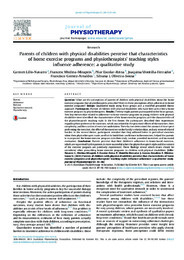Por favor, use este identificador para citar o enlazar este ítem:
https://hdl.handle.net/11000/37939Full metadata record
| DC Field | Value | Language |
|---|---|---|
| dc.contributor.author | Lillo-Navarro, Carmen | - |
| dc.contributor.author | Medina-Mirapeix, Francesc | - |
| dc.contributor.author | ESCOLAR-REINA, Mª PILAR | - |
| dc.contributor.author | MONTILLA-HERRADOR, JOAQUINA | - |
| dc.contributor.author | Gomez-Arnaldos, Francisco | - |
| dc.contributor.author | Oliveira-Sousa, Silvana Loana | - |
| dc.contributor.other | Departamentos de la UMH::Patología y Cirugía | es_ES |
| dc.date.accessioned | 2025-11-07T09:00:13Z | - |
| dc.date.available | 2025-11-07T09:00:13Z | - |
| dc.date.created | 2015-04 | - |
| dc.identifier.citation | Journal of Physiotherapy. Volume 61, Issue 2, April 2015, Pages 81-86 | es_ES |
| dc.identifier.issn | 1836-9561 | - |
| dc.identifier.issn | 1836-9553 | - |
| dc.identifier.uri | https://hdl.handle.net/11000/37939 | - |
| dc.description.abstract | Question: What are the perceptions of parents of children with physical disabilities about the home exercise programs that physiotherapists prescribe? How do these perceptions affect adherence to home exercise programs? Design: Qualitative study using focus groups and a modified grounded theory approach. Participants: Parents of children with physical disabilities who have been prescribed a home exercise program by physiotherapists. Results: Twenty-eight parents participated in the focus groups. Two key themes that related to adherence to home exercise programs in young children with physical disabilities were identified: the characteristics of the home exercise program; and the characteristics of the physiotherapist’s teaching style. In the first theme, the participants described their experiences regarding their preference for exercises, which was related to the perceived effects of the exercises, their complexity, and the number of exercises undertaken. These factors determined the amount of time spent performing the exercises, the effect of the exercises on the family’s relationships, and any sense of related burden. In the second theme, participants revealed that they adhered better to prescribed exercises when their physiotherapist made an effort to build their confidence in the exercises, helped the parents to incorporate the home exercise program into their daily routine, provided incentives and increased motivation. Conclusion: Parents perceive that their children’s adherence to home-based exercises, which are supervised by the parents, is more successful when the physiotherapist’s style and the content of the exercise program are positively experienced. These findings reveal which issues should be considered when prescribing home exercise programs to children with physical disabilities. | es_ES |
| dc.format | application/pdf | es_ES |
| dc.format.extent | 6 | es_ES |
| dc.language.iso | eng | es_ES |
| dc.publisher | Elsevier | es_ES |
| dc.rights | info:eu-repo/semantics/openAccess | es_ES |
| dc.rights | Attribution-NonCommercial-NoDerivatives 4.0 Internacional | * |
| dc.rights.uri | http://creativecommons.org/licenses/by-nc-nd/4.0/ | * |
| dc.subject | Parents | es_ES |
| dc.subject | Adherence | es_ES |
| dc.subject | Exercise | es_ES |
| dc.subject | Qualitative research | es_ES |
| dc.subject | Physiotherapy | es_ES |
| dc.subject.other | CDU::6 - Ciencias aplicadas::61 - Medicina | es_ES |
| dc.title | Parents of children with physical disabilities perceive that characteristics of home exercise programs and physiotherapists’ teaching styles influence adherence: a qualitative study | es_ES |
| dc.type | info:eu-repo/semantics/article | es_ES |
| dc.relation.publisherversion | https://doi.org/10.1016/j.jphys.2015.02.014 | es_ES |

View/Open:
Parents of children with physical disabilities perceive that characteristics of home exercise programs and physiotherapists teaching style influence adherence a qualitative study.pdf
282,82 kB
Adobe PDF
Share:
.png)
